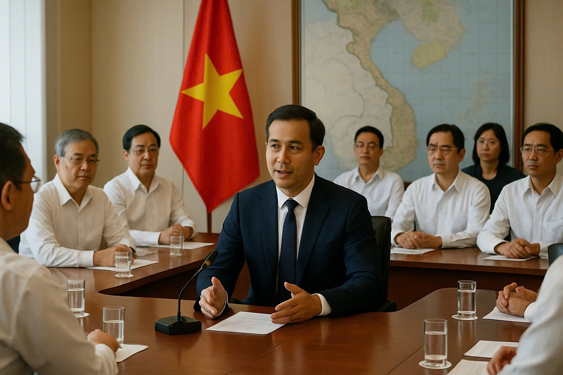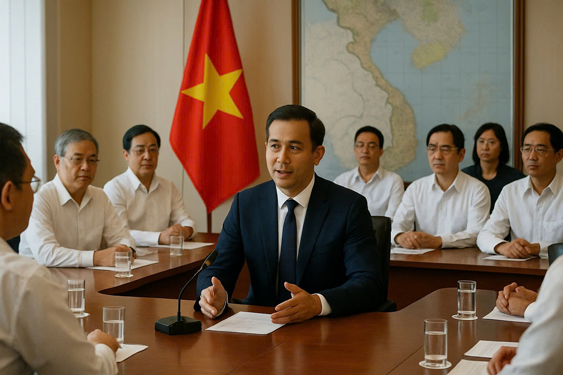Flexible Mechanism Establishment
According to the drafting agency, many countries have adopted a model of non-civil service contracts for highly specialized positions. In practice, many government agencies in Vietnam are in need of hiring people to perform seasonal, peculiar, or non-permanent tasks – such as digital transformation, information technology services, and database building…
Hiring experts outside the civil service system helps to quickly meet the requirements of the task and reduce the pressure on personnel and operating costs. The drafting agency believes that some tasks, such as law making and enforcement, economic governance, and data analysis, require high professional qualifications that the current civil servant team cannot meet.

Many entrepreneurs expressed their desire to contribute to the country if they were valued. Illustration by GIANG NAM
Meanwhile, the current regulations on labor contracts must conform to the assigned personnel and regular budget allocation, making it difficult to sign contracts when the actual demand exceeds the allocated quota. There is also a lack of flexibility in handling situations where there is a need for short-term labor contracts.
Therefore, in the draft decree, the Ministry of Home Affairs proposes a time-limited contract mechanism to attract managers, entrepreneurs, lawyers, and leading experts to work in government agencies. At the same time, it proposes a list of tasks to be performed under contract, including a group of management and leadership tasks and a group of professional and technical tasks performed according to the job position catalog of civil servants. The signing can be done in the form of a labor contract or a service contract.
According to the Ministry of Home Affairs, the subjects of the contract include excellent managers and entrepreneurs; lawyers, leading experts, and scientists; and those who meet the qualifications and have experience relevant to the specialized position. The subjects of the labor contract are not included in the assigned personnel of the agency, organization, or unit. The maximum term of the contract is 24 months for a labor contract in a leadership or specialized position and 36 months for a service contract for a specialized task.
At a press briefing, Minister of Home Affairs Pham Thi Thanh Tra stated that the drafting agency expects to maximize the experience and expertise of entrepreneurs, scientists, and experts to improve management efficiency, streamline the apparatus, and promote administrative reform. According to the Minister, the direct involvement of high-quality social resources in public service will contribute to enhancing the performance of the state apparatus.
Public Administration Innovation: Need for a New Mechanism
The above proposal has attracted the attention of public opinion, especially experts, lawyers, and entrepreneurs. They believe that the targeted individuals usually go through startups, experiencing gains and losses in the harsh market and have proven their worth through societal recognition.
Ms. Pham Lan Khanh, Director of Flamingo Digital Communications Joint Stock Company, an entrepreneur who started her business in the technology field, considers this proposal a breakthrough in the strategy to attract talents to the public sector. In her opinion, this signals the boldness and openness of the state in collaborating with the non-state sector, creating opportunities for high-quality resources to contribute to administrative reform and national development. Especially, this mechanism can overcome the barriers of traditional civil servant recruitment regulations, creating more room for public administration thinking innovation.
However, this issue also poses challenges. Firstly, how can we ensure objectivity and transparency in the selection process? It is also difficult to avoid power control and conflict of interest when a successful private sector individual takes on a leadership role in the public sector. How can we integrate the work culture between civil servants and those who have never been civil servants…
Therefore, the state needs to have a clear and fair salary and performance evaluation mechanism. “The selection should be based on competence, achievements, reputation, and practical effectiveness, through a careful evaluation and selection process. A time-limited contract regime can be applied instead of the traditional long-term appointment” – Ms. Khanh suggested.
The chairman of an international education group in Ho Chi Minh City shared that he has been running the business for almost 20 years, going through many ups and downs in the country’s economic cycles and working with many state agencies at different levels. Therefore, he deeply understands the environment of both the public and private sectors.
According to him, the proposal to invite entrepreneurs and experts to join the leadership and management team in the public sector is a positive signal, reflecting the innovative thinking and open-mindedness of the government. But to put this idea into practice, many barriers need to be overcome, ranging from thinking and mechanisms to civil service culture.
He emphasized that if entrusted with a responsibility, he would not need to be on the payroll or enjoy civil servant benefits. What he needs is an efficient working environment where leaders can make decisions, take responsibility, and are not bound by cumbersome administrative procedures.
“I am willing to contribute, but I want to be treated as someone with real value, not just for show. If the state wants to change and knows how to utilize people, those of us who have weathered the storms of the business world will not stand idly by” – he said.
Devotion to the Country
Sharing the same viewpoint, Lawyer Tran Van Tuan, Director of Nhat Viet Law Company Limited, expressed his interest in the Ministry of Home Affairs’ proposal. “I highly appreciate this proposal and consider it very timely. It is not only an invitation but also a signal that the country is changing, opening its doors to intellectuals and talented individuals who wish to contribute to the country from the private sector” – Lawyer Tuan expressed.
Lawyer Tuan, with over 15 years of accompanying enterprises, individuals, and authorities at different levels to solve legal problems, protect justice, and promote the spirit of law respect, has a deep understanding of the gaps between law and real life through thousands of big and small cases.
He also said that if valued, he would not need to be on the payroll or demand special privileges. What he needs is a clear and transparent mechanism with sufficient authority. He also expects that if the state gives opportunities, it should also give trust. Only then can those with competence and dedication wholeheartedly devote themselves to serving the country.
Regarding the feasibility of the proposal, Lawyer Tuan believes that it requires a combination of practicality, caution, and the government’s reform goodwill. According to him, the biggest challenge is not the lack of talented individuals willing to contribute but the design of a “receptive mechanism” that is flexible and transparent enough for outsiders to play their roles without being constrained by the old way of operating.
Bottleneck to be Addressed
Minister Pham Thi Thanh Tra argued that the lack of an appropriate financial mechanism to offer competitive remuneration hinders the attraction of top experts. The budget allocation is based on personnel, not performance, making many agencies reluctant to hire talents due to legal and resource constraints. This bottleneck needs to be addressed to transition to a performance-based public administration. By establishing a new mechanism, we can attract talents, utilize the budget efficiently, build a modern administration, and measure success by results.
According to Lawyer Tran Van Tuan, three prerequisites are necessary for the proposal’s feasibility. First, there must be a change in the mindset towards accepting outsiders – no suspicion or formality, but a genuine willingness to collaborate for the common good. Second, standardize the contract process and clearly delegate authority so that talented individuals have responsibility, the power to act, and are assessed based on results. Third, it is advisable to pilot the model in some localities or sectors before widespread implementation to avoid premature deployment without sufficient preparation. “To reform, we must accept the new and create a mechanism for it to survive and thrive within the current apparatus. If we only advocate without amending laws, habits, and attitudes, talents will find it difficult to make a meaningful impact” – Lawyer Tuan stated.
















